How do you know if the agency you’re considering is any good?
Reports from the Content Marketing Institute show that 75% of marketers use digital marketing tactics to increase their company’s trust and credibility.
Digital marketing can be confusing and frustrating, especially if you’re not versed in the jargon or unfamiliar with the process.
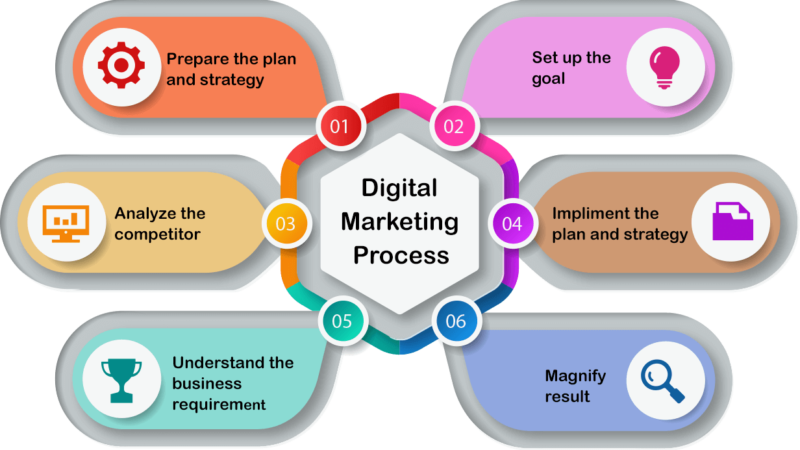
(Source: Ads Lab360)
These days, digital marketing agencies are popping up all over the internet. But, unfortunately, it’s hard to know who to trust and avoid, especially since most companies aren’t upfront about their fees or what they can offer you regarding marketing results and services.
If you’re considering hiring a digital marketing agency, then it’s important to have some marketing questions to ask a company prepared before you start finding one.
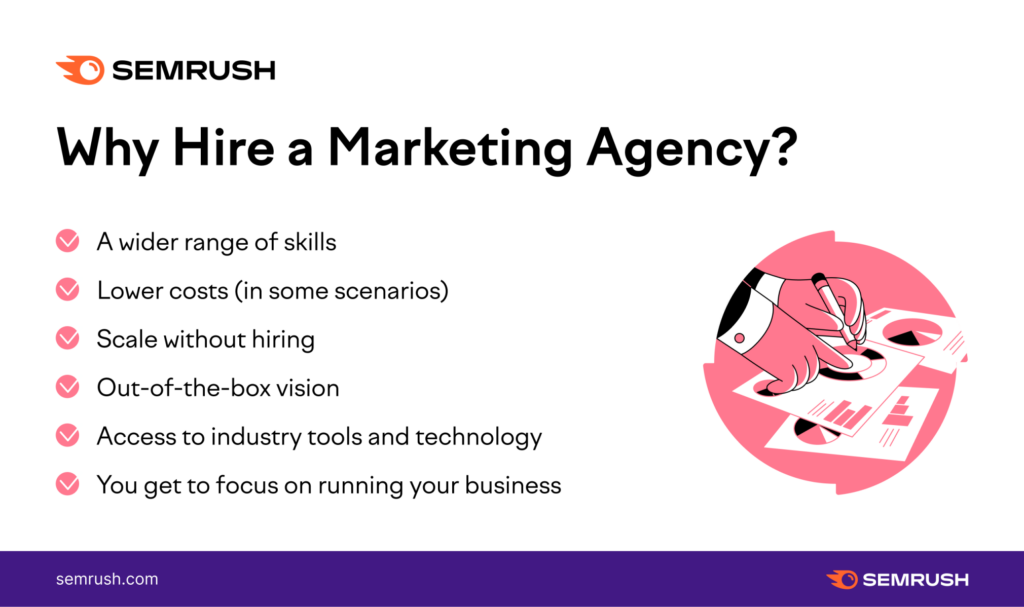
(Source: Semrush)
Here are some questions to ask a digital marketing agency before signing the dotted line. These will help you understand what services the agency offers and whether it’s the right fit for your needs and goals.
- Question 1: How Do You Approach Content Marketing and SEO?
- Question 2: What Platforms Do You Specialize in for Paid Ads (Facebook, Google Ads, Etc)?
- Question 3: What Is Your Strategy for Increasing Website Traffic and Leads?
- Question 4: Do You Have Experience Working With Businesses in My Industry (Or a Similar Industry)?
- Question 5: Can You Provide Me With Case Studies or Examples of Successful Campaigns You’ve Run For Other Clients?
- Question 6: How Do You Measure Success – What Are the Key Performance Indicators (KPIs) You Use?
- Question 7: What’s Included in Your Pricing, and Are There Any Additional Costs That I Should Be Aware Of?
- Question 8: What Kind of Results Can I Expect From Working With You, and Over What Time Frame Will I See These Results?
- Question 9: Do You Have Any References or Testimonials From Previous Clients I Can Speak to About Your Services?
- Question 10: What Are Your Expectations of Us as a Client?
- Question 11: What Kind of Reporting Can I Expect?
Let’s look deeper into these questions to ask before hiring a digital marketing agency!
- Question 1: How Do You Approach Content Marketing and SEO?
- What is Content Marketing?
- Why use Content Marketing?
- Things to Consider when Creating your Content Plan
- What is SEO?
- Why Invest in SEO?
- Tips for Getting Started with Developing a Successful SEO Plan and Content Marketing Strategy
- What are the Components of an Effective Content Marketing and SEO Campaign?
- Question 2: What Platforms Do You Specialize in for Paid Ads (Facebook, Google Ads, Etc)?
- Question 3: What Is Your Strategy for Increasing Website Traffic and Leads?
- 1) Design your Website with Visitors in Mind
- 2) Be Mobile-friendly
- 3) Use SEO Keywords Correctly
- 4) Add Blog Posts Regularly
- 5) Optimize your Landing Pages
- 6) Upload Optimized Images on Social Media
- 7) Use Compelling Headlines
- 8. Add Social Sharing Buttons to your Blog Posts for Easy Shareability on Social Media Platforms
- 9. Create Engaging Content on Social Media
- 10. Guest Blog like a Pro
- 11. Optimize your Site’s Internal Linking Structure
- 12. Utilize Effective Call-to-Actions
- 13. Ensure Site Speed is Fast
- Question 4: Do You Have Experience Working With Businesses in My Industry (Or a Similar Industry)?
- Question 5: Can You Provide Me With Case Studies or Examples of Successful Campaigns You’ve Run For Other Clients?
- Question 6: How Do You Measure Success – What Are the Key Performance Indicators (KPIs) You Use?
- 1) Website Traffic
- 2) Organic Search Traffic
- 3) Paid Search Traffic
- 4) Churn Rate
- 5) Acquisition Cost
- 6) Average Order Value (AOV)
- 7) Customer Lifetime Value (LTV)
- 8) Conversion Rate
- 9) Brand Awareness
- 10) Engagement Rate
- 11) Social Media Engagement Rate
- 12) Click-through Rate
- 13) Cost Per Click
- 14) Cost Per Lead
- 15) Impressions
- 16) Reach
- Question 7: What’s Included in Your Pricing, and Are There Any Additional Costs That I Should Be Aware Of?
- Question 8: What Kind of Results Can I Expect From Working With You, and Over What Time Frame Will I See These Results?
- Question 9: Do You Have Any References or Testimonials From Previous Clients I Can Speak to About Your Services?
- Question 10: What Are Your Expectations of Us as a Client?
- Question 11: What Kind of Reporting Can I Expect?
- How Can You Tell Who To Trust?
Question 1: How Do You Approach Content Marketing and SEO?
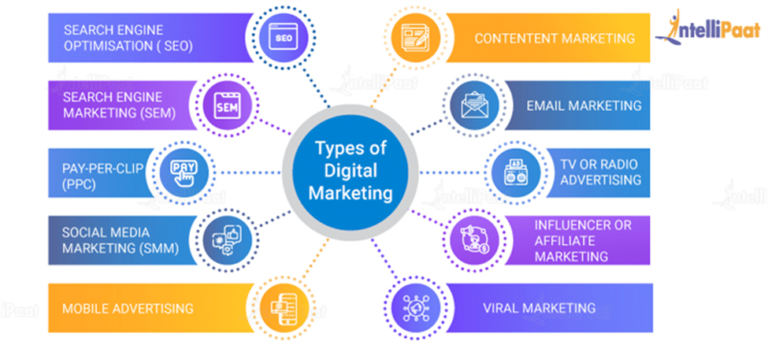
(Source: Intellipaat)
Content marketing and SEO are two of the most important aspects of digital marketing. Understanding how an agency approaches these tasks will help you decide if their strategy is right for your business. Hence, this should be one of the first questions to ask before hiring a digital marketing agency.
The answers to this question should give you a good idea of the company’s content marketing and SEO capabilities.
First, ask about their content strategy: Do they have a dedicated in-house team? What types of content do they create? How often do they post on social media? How do they measure success?
If you are wondering what content marketing entails, let’s break it down.
What is Content Marketing?
Content marketing can be a powerful tool for companies looking to promote their products and services to potential customers.
It is a form of marketing in which you create and share valuable, relevant, and consistent content with your target market. This type of marketing is also known as inbound marketing because it attracts customers like a magnet.
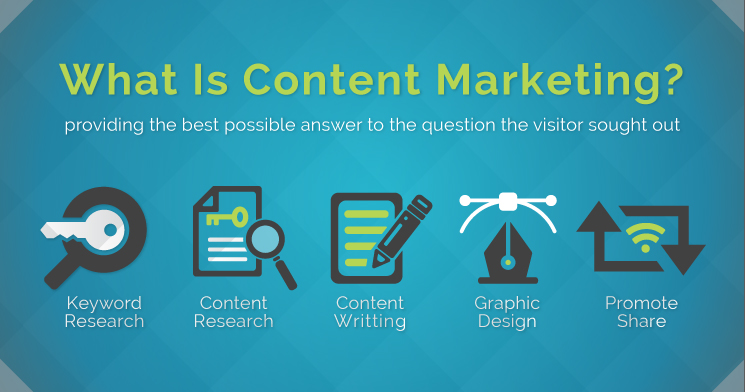
(Source: Maneuver Up)
If you’re unfamiliar with content marketing, it’s essentially any form of marketing that involves the creation of educational content about your product or service to attract potential customers and earn their trust, ultimately leading them to purchase from you rather than from your competitors.
Content marketing provides value to customers by solving their problems, answering their questions, and engaging them on topics they are interested in.
As opposed to traditional forms of marketing that use interruptive methods such as ads on TV or radio, content marketing includes blogging, social media posts, infographics, videos (e.g., tutorials), podcasts, etcetera.
Why use Content Marketing?
Content marketing is a valuable digital strategy because it engages customers and teaches them about your products and services. Over 70% of marketers consider content marketing a better way of knowing a company than print ads.

(Source: WebFX)
It can be used as a top-of-funnel strategy to attract new customers or as a mid-funnel strategy to nurture existing ones.
The content you publish should have SEO keywords to attract targeted traffic. Once you’ve created a steady stream of quality content, Google will reward you by ranking your site higher in search engine results pages (SERPs).
The next step is optimizing this content for social media channels like Facebook and Twitter, which are more likely to bring in fresh eyes from around the world.
Things to Consider when Creating your Content Plan
If you are ready to create your content marketing plan, consider these things:
- Start by doing research. Know what your audience is looking for and the top content topics in your industry.
- Ask yourself important questions such as:
- What are your goals?
- Who is your target audience?
- What are their interests, values, and concerns?
- How can you use content to engage with them on a personal level?
- Which platforms will you use for marketing, and what will you post there?
- What are the most popular topics in your industry right now?
- Do you have the time and resources necessary to create quality content?
- Is there an area of expertise you could write about or share with others?
- Does anyone in your organization have an area of expertise they could contribute articles about?
- Create a content calendar, making sure to include both short-term and long-term goals.
- Set deadlines for yourself and hold yourself accountable so you can get work done on time.
- Select what type of content you want: text, photo, video, or infographics.
- Determine what format will work best for each piece of content. For example, is it better as an audio recording? A PowerPoint presentation? A blog post?
- Get feedback from others before you publish anything. Ask people outside your target market to review your content because they may be able to point out things that a person within your target market may not notice.
Second, ask about search engine optimization (SEO):
For example, do they use white hat methods, and what strategies do they employ? For example, does this agency focus more on website optimization or link building? These are some of the questions to ask a digital marketer.
What is SEO?
SEO must be among the questions to ask an advertising agency because SEO, or search engine optimization, is integral to digital marketing. SEO is the process of optimizing a website for search engines and can be accomplished through several different tactics.
If your website ranks high on the first page of Google, you’ll get more traffic and potentially more customers than if your site sits lower down on the second page.
It’s important to note that there are two components: on-page optimization and off-page optimization. On-page optimization involves creating a site that search engine spiders can crawl and index, while off-page optimization involves attracting links from other sites or social media platforms.
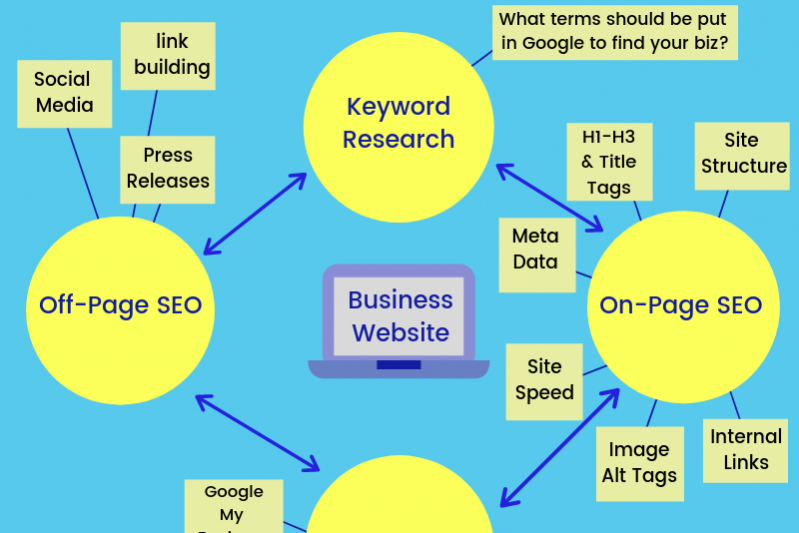
(Source: Bizmap)
There are many ways you can optimize your content using these strategies. For example, you could use keywords in your meta tags or title tag, leading the search engine spider to rank your content higher.
Another way is by using popular keywords in your content so that it gets indexed and ranked by Google, Yahoo! Search, etc.
Why Invest in SEO?
Even though SEO is one of the most essential questions to ask an advertising agency, most companies don’t know why they need to invest in SEO.
Investing in search engine optimization is an important aspect of any digital marketing strategy, and it can help you make a lasting impression on your target audience. When people search for your offer, your company should be the first thing they find.
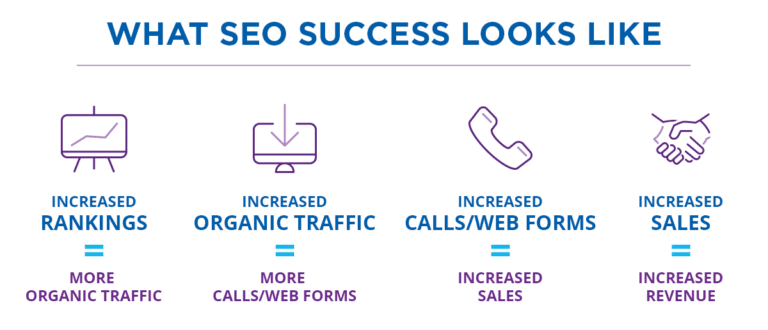
(Source: Blue Corona)
The good news is that you can take some simple steps to rank higher in search engine results pages (SERPs). With a little time and effort, you’ll be well on your way to getting more traffic and generating more leads.
Tips for Getting Started with Developing a Successful SEO Plan and Content Marketing Strategy
It’s no secret that Google has its hands in content marketing—and they want to keep it that way. Search engine optimization (SEO) is what marketers focus on when optimizing a website so that it ranks well in search engine results.
But with algorithm changes, you may need to adjust your SEO success strategy and consider new opportunities for content marketing success.
These tips will help you get started with developing a successful SEO plan and content marketing strategy
1. Write Great Copy:
If you have an amazing product or service, chances are you have great things to say about it. So why not put those words into writing? Great copy can be written by anyone—not just professional writers.
You can use tools like Hemingway App or Grammarly to check your grammar and spelling while ensuring that your copy is easy to read and understand.
2. Use Keywords Strategically:
Keywords are important for every piece of content you create—especially if you want to rank highly in search engines. Please don’t overdo it, though; keyword stuffing won’t do anything but hurt your rankings.
The best practice is to find one or two keywords that describe your business and include them naturally throughout each piece of content.
3. Add Visuals:
Visuals make content more interesting, which makes readers more likely to share it. Plus, adding visuals gives you another opportunity to incorporate your keywords.
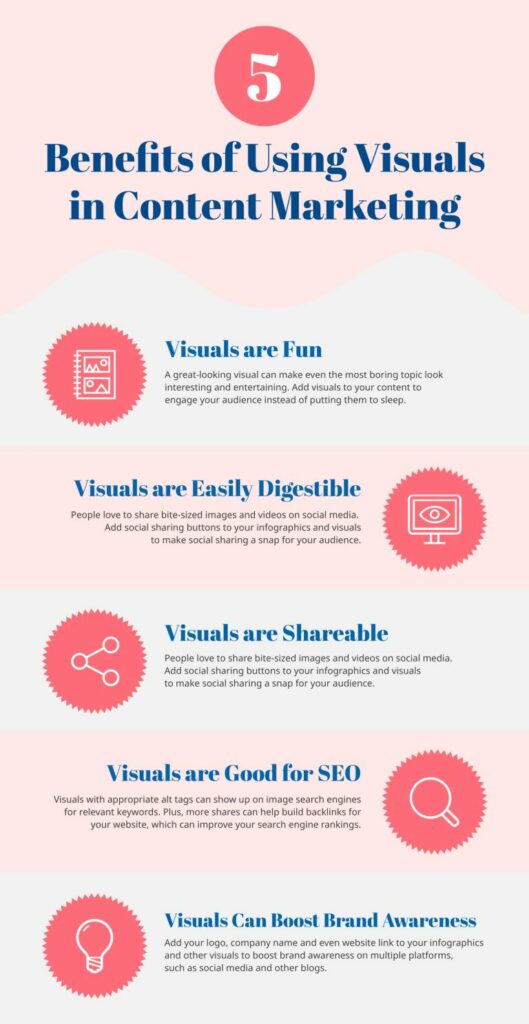
(Source: Visme)
4. Include Links Back to Your Site:
Links back to your site tell search engines that people are linking back to pages on your site because they’re relevant and valuable.
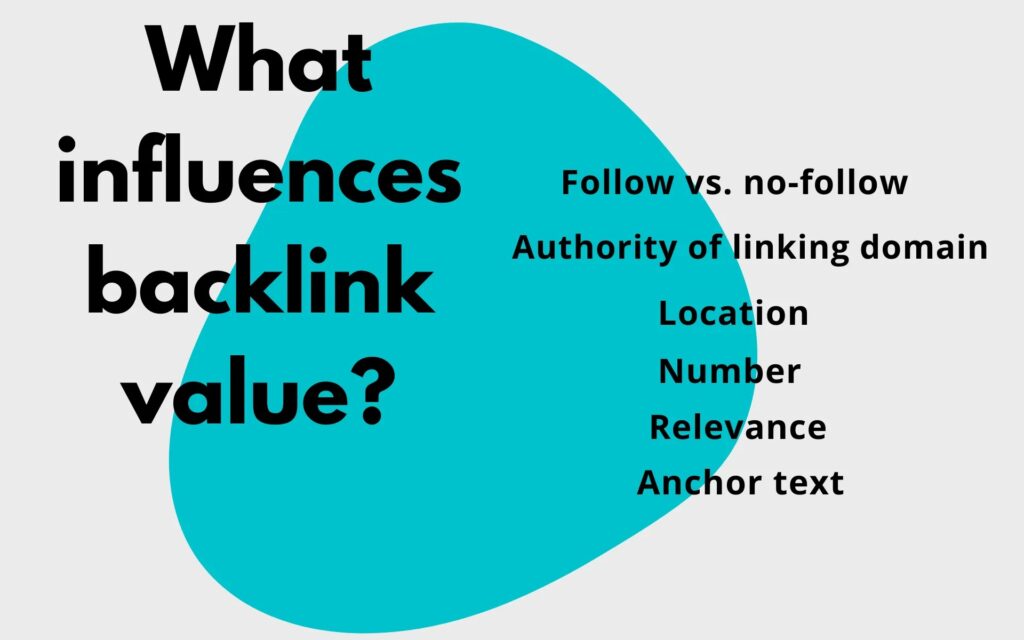
(Source: Rivalmind)
5. Optimize all Images with Alt Text:
The alt text describes images visually for people who can’t see them—like screen readers used by visually impaired people.
6. Create Unique Titles and Meta Descriptions:
Unique titles and meta descriptions help search engines determine whether your page is relevant to a user’s query.
7. Keep Track of Analytics:
Analytics lets you know how many people are visiting your site, where they’re coming from, how long they stay on your page, etc., allowing you to determine what works and doesn’t.
8. Be Consistent with Time Zones:
Be sure that all dates are formatted correctly according to the time zone
9. Avoid Duplicate Content:
Duplicate content refers to identical web pages except for their URL.
10. Avoid Thin Content:
Thin content refers to low-quality pages created only to fill space on a site. As a result, they don’t add value to users or search engines. Instead, focus your efforts on creating high-quality content that users want to read.
What are the Components of an Effective Content Marketing and SEO Campaign?
Creating an effective content marketing and SEO campaign involves a lot of moving pieces. Still, once you understand how these components work together, you’ll be able to create highly effective campaigns that deliver value and return on investment (ROI).
Before hiring a digital marketing agency to handle your campaign, you should also know the components of an effective campaign. This knowledge will make it easier for you to know what to expect from the agency.
Social Media:
Even the most effective marketing campaigns have a social media element. Whether it’s Facebook, Twitter, or Instagram, having an active profile where you can share content is paramount to the success of your campaign.
Search Engines:
For your content marketing and SEO campaign to be successful, there must be search engines that index your content. Whether it’s a website or social media, you need the search engines crawling these pages so they can appear in search results.
Influencers:
The more influencers you have on board with your content marketing campaign, the better your chance of reaching more people.
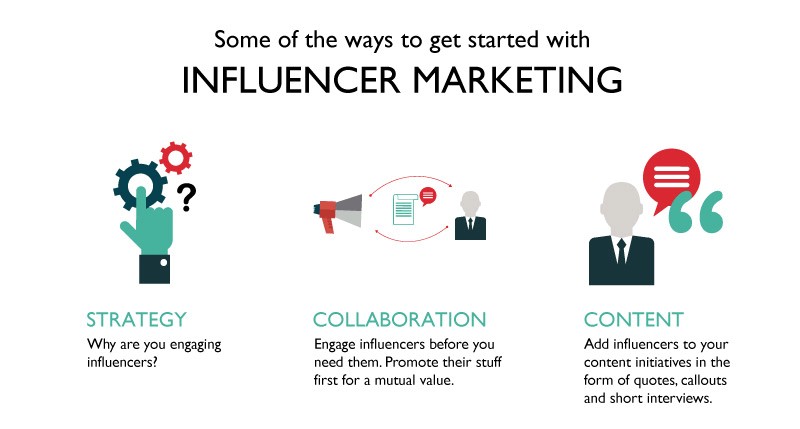
(Source: Bryony)
Having celebrities endorse products is one of the ways companies influence marketing well; however, getting influencers on board who are respected by their target market is just as important.
Paid Advertising:
No matter how good your content marketing strategy is, it won’t work if no one sees it. That’s why paid advertising has become integral to digital marketing campaigns.
Pay-per-click ads allow you to spend money when someone clicks on your ad, meaning you don’t pay unless someone views your ad. It is a great way to get more eyes on your content.
It also allows you to refine your targeting to ensure you’re only paying when someone clicks on an ad related to your niche.
Lead Generation:
Lead generation should be a huge component if you want to see real ROI from any digital marketing campaign. When consumers enter their information into a form provided by your business, they have already indicated an interest in what you sell.
You should then store the information captured through these forms for future contact via email or phone call. It will allow you to stay top-of-mind when it comes time for them to make a purchase decision.
Affiliate Programs:
Affiliate programs can help increase sales without adding additional costs to your budget. You offer affiliate commissions based on each sale made by affiliates using links provided within your content.
It helps incentivize others to spread your message while keeping all costs down.
Question 2: What Platforms Do You Specialize in for Paid Ads (Facebook, Google Ads, Etc)?
It can be tough to know where to begin with paid advertising, that’s why it is included as one of the questions to ask a digital marketer. There are so many options out there, and it’s hard to know which one will give you the best bang for your buck, not to mention the best fit for your company overall.
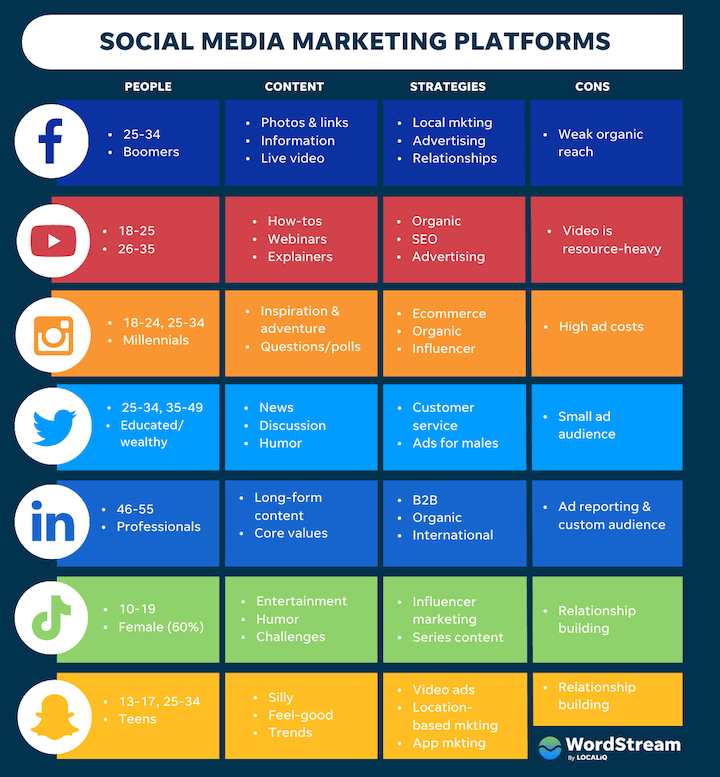
(Source: WordStream)
Here are the top seven paid advertising platforms currently on the market that can help you market your business and turn potential customers into repeat customers (or loyal lifelong fans).
1) Facebook
Facebook has become one of the most popular social media sites because of its user-friendly interface and easy access. It’s also a great place for your paid ad to reach a wider audience.
One of the best things about Facebook advertising is that you can target specific people based on demographics, interests, behaviors, and more. Plus, Facebook ads are easy to set up your ad with just a few clicks.
2) Instagram
Instagram is a social media platform that allows users to post photos and videos. It’s also great for businesses to advertise their products or services.
Make use of all the different types of advertisements available on Instagram, and try experimenting with new ones to figure out what works best for your business!
3) LinkedIn
LinkedIn is one of the most popular platforms for business owners. It’s a great place to find leads, employees, and investors. LinkedIn also has a section where you can create an ad campaign targeting your desired audience. You can promote your product or service with a sponsored post.
You have access to everything from simple text ads to video ads on LinkedIn, making it one of the best platforms specializing in paid ads.
4) Google Ads
Google Ads is one of the best platforms for paid advertising. With Google Ads, you can create a highly targeted ad campaign that reaches customers in your geographic area and customers with similar interests and behaviors.
You can also create ads tailored specifically to mobile devices, making it one of the best options if your target market is on-the-go. In addition, it’s quick and easy to set up, so you can start immediately.
5) Pinterest
Pinterest is one of the best platforms for brands looking to promote their products.
The site has more than 500 million monthly users, most of whom are women between the ages of 25 and 54. Plus, as of 2015, Pinterest users spent an average of 100 minutes per month on the site. That’s not even counting how long they scroll through what they find.
Such engagement means you could reach new customers while they’re actively browsing and feeling like they want to buy something right away – or at least come back soon.
6) Twitter
It’s time to get serious about your social media strategy. Twitter is one of the most effective platforms for getting the word out about your company and engaging with customers on a more personal level.
7) Snapchat
Snapchat is a photo and video-sharing social media platform launched in 2011. Snapchat allows users to share images and videos only available for 24 hours.
The idea behind the app is that you share what is happening at the moment rather than waiting until later to upload a photo or video. It gives Snapchat users a chance to be spontaneous and creative with their photos and take risks.
8. YouTube Ads
YouTube Ads is a paid advertising platform from Google that enables advertisers to promote their videos on YouTube and its related websites. The ads appear across the site, in search results, and on partner sites.
YouTube Ads offer video views from people interested in your industry or demographic, so it has great potential as an advertising channel to reach new audiences.
With these ads, you can target specific demographics by age group, gender, location, interests, parental status, and employment status, enabling you to target your desired audience better than traditional TV or radio channels.
Now that we’ve covered the basics of paid ads, let’s return to the question: “What Platforms Do You Specialize in for Paid Ads?”
The number of platforms for paid ads you should focus on depends on your marketing goals. For example, if you are looking for more in-store traffic, you may want to focus on Facebook and Google Ads.
However, if you want to target sales leads or build brand awareness, LinkedIn and Twitter Ads might be better options. The digital marketing agency you hire must have experience with all of these platforms so they can recommend what will work best for your business.
Question 3: What Is Your Strategy for Increasing Website Traffic and Leads?
Website traffic and leads are the lifeblood of your business; the more you have, the more opportunity you’ll have to convert them into customers.
Fortunately, you can maximize your website’s traffic and leads, from picking an effective lead magnet to optimizing your website for search engines, writing better calls-to-action, and regularly adding fresh content to your site.
In short, there is no one-size-fits-all approach to driving traffic to your website and converting that traffic into leads. Therefore, it’s important to work with an agency that will understand your needs so they can provide a customized solution for achieving success online.
In light of this, here are the top 10 strategies to boost your website traffic and leads.
1) Design your Website with Visitors in Mind
Designing your website with visitors in mind can help you generate more leads. The 75% of customers who judge a company’s credibility based on the quality of its website design prove this.
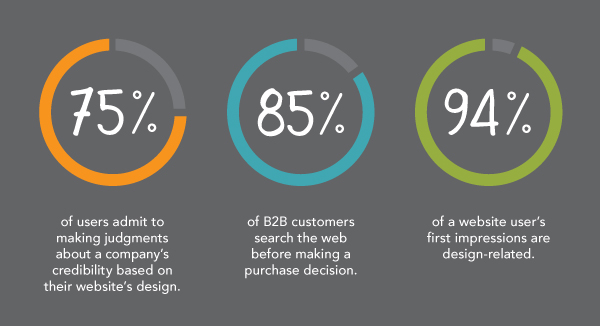
(Source: Kinesis)
In addition, visitors will have a better experience on your site, making them more likely to sign up for your email newsletter or download your free e-book.
Don’t just focus on the content of your website. Focus also on what the visitor is doing when they visit your site, where they are coming from, and what they are looking at while browsing around.
A successful website is an effective tool that can help you generate more sales and leads if it meets the needs of those who visit it.
2) Be Mobile-friendly
The mobile landscape is changing so rapidly that you must continuously update your design. For example, mobile site users spend more time reading text-based content (such as a web page or an e-book) than viewing videos or photos.
According to statistics, 90% of the time spent on mobile devices is spent on apps. That means that 90% of your potential customers use an app instead of your website.
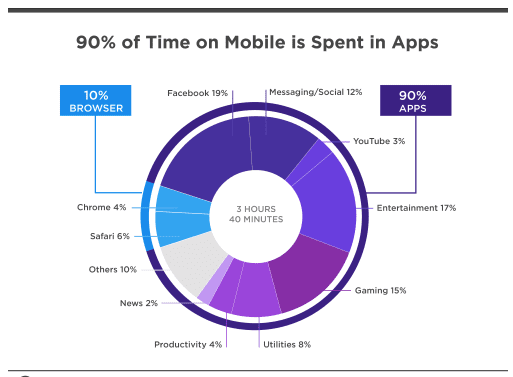
(Source: Buildfire)
To accommodate this shift in customer behavior, you should build a mobile-friendly site or at least have a responsive web design that can work well with any device.
You should ensure that your website design is optimized for desktop computers and mobile devices so that each visitor can have a positive experience with your brand.
Mobile visitors expect the same quality from your company, making it all the more important for them to access information quickly and easily from anywhere.
By focusing on your mobile optimization strategy, you can ensure that these users will be satisfied with their visit while searching for products online.
Look at Google’s mobile-friendly test to see how well your site fares. To be fully mobile-friendly, you need good navigation and readable text.
3) Use SEO Keywords Correctly
Search Engine Optimization (SEO) is a great way to boost your website’s traffic and leads. Here are ten ways you can use SEO keywords correctly:
- Use keywords in the title of your blog post, but not excessively. Too many keywords will make the title look spammy or too salesy, which could negatively affect readers.
- Spend time using specific keyword phrases throughout the text of your blog post. Don’t just focus on one phrase – include it as part of several sentences and include synonyms to increase its prominence.
- Add an image with captions containing keywords relevant to the topic.
- Mention specific products or services within a sentence that makes sense for them to be mentioned, like “The Quiznos near my house sells coupons.”
- Include links to other articles related to yours. Then, if someone clicks on the link and finds something they enjoy, they might come back to read more about your topic.
- Be sure that any text links also have strong, unique anchor text so people know what they’re clicking on when they see it embedded in a sentence.
- Ensure all graphics have alt tags with keywords so search engine spiders can find them easily and rank them higher than others that don’t have descriptive alt tags.
- Think about how you can make the page load faster. For example, consider deleting unnecessary images, reducing file size on images if possible, and making sure JavaScript files are cached.
- Try to avoid Flash content because search engines can’t index it well.
- Experiment with different combinations of keywords until you find a strategy that works best for you
4) Add Blog Posts Regularly
Adding blog posts will help you increase your website traffic and leads. An Orbit Media report reveals that 80 percent of bloggers say that blogging is very effective in driving results.
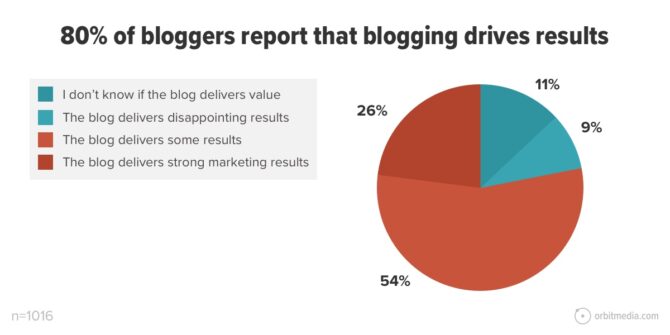
(Source: Orbit Media)
In addition, content marketing is one of the most effective ways to build awareness for your business on social media sites like Facebook, Twitter, Pinterest, Google+, etc.
Plus, blogging allows you to share your knowledge with customers. As a result, they’ll come to trust you as an expert in your field.
Regularly adding blog posts will also create new avenues for generating revenue from ads or affiliate links that you can add within the text.
5) Optimize your Landing Pages
When it comes to increasing your website traffic, optimizing your landing pages can be one of the best ways. Not only does this method allow you to increase your website’s conversion rate, but you can also tailor your message for a more personalized touch.
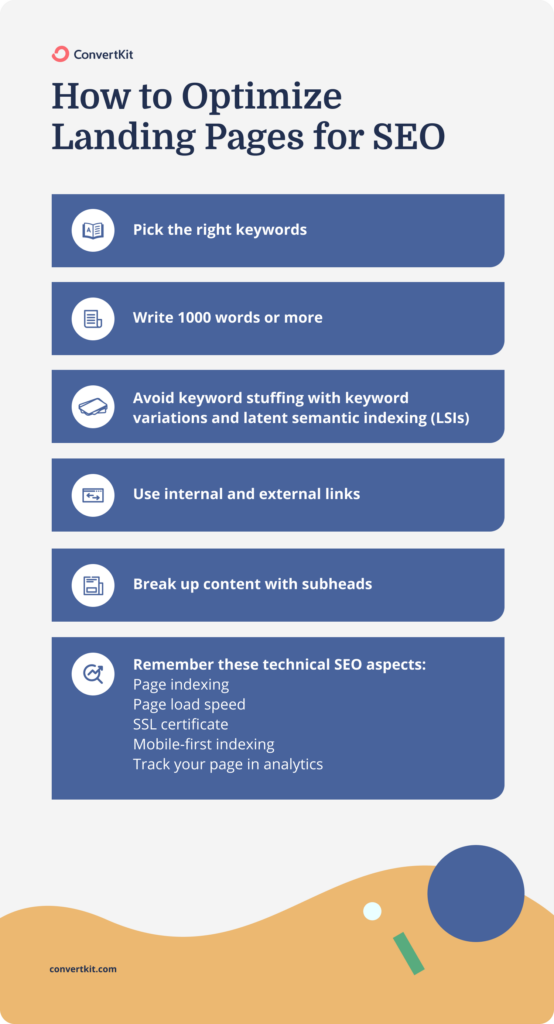
(Source: ConvertKit)
Here are some ways that optimizing your landing pages can help:
- Optimizing your landing pages for keywords will allow you to rank higher in search engines for relevant keywords that people might be searching for.
- Using conversion optimization techniques such as lead forms on all your landing pages means you won’t lose potential leads while visiting your site by having them abandon the page without completing any action steps.
- Analyzing which landing pages convert the highest means, you’ll know which ones you should put into heavy rotation and which ones should be phased out altogether.
- You can do many things with optimization techniques that make sense for your business model.
- Ensuring that all images are optimized is another way to drive up web traffic since people like seeing visual representations of items they could buy.
- The simpler you keep your landing pages, the easier it is for people who visit them to find what they’re looking for quickly and easily.
- Use analytics tools to see where people stop on your site – these data points will help guide future content creation efforts or changes in marketing strategy in the future.
6) Upload Optimized Images on Social Media
Effective lead generation should include an online component, as well. One of the best ways is by uploading optimized images on social media sites like Facebook, Twitter, Pinterest, Instagram, or LinkedIn.
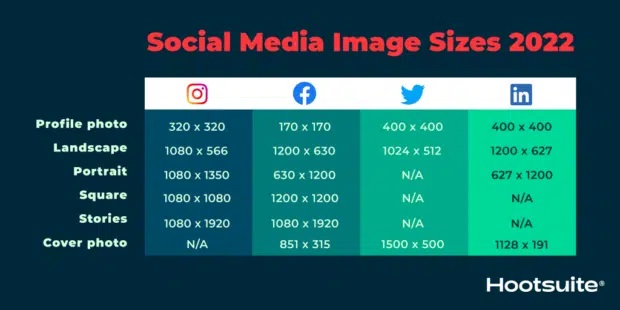
(Source: Hootsuite)
These sites help people find images that match their interests much faster than search engines. A few minutes of content uploading can help make your business more visible to potential customers actively looking for it.
7) Use Compelling Headlines
How can you make your headlines more compelling?
a. Use Numbers:
We know from the previous study that people love numbers, so why not use them as part of your headline?
Ensure the number is relevant to the blog post’s content; otherwise, it will seem an afterthought.
For example, if you’re talking about increasing customer loyalty, the best strategy would be to highlight that over half of customers are less likely to repurchase from companies seen as unfriendly or unhelpful.
b. Capture their Attention:
If you want someone to read your blog post, then make sure they can find it in search engine results. To do this, write a catchy headline and include keywords related to the content of your post.

(Source: Content Writers)
c. Be Specific:
When writing headings, keep them concise yet descriptive enough, so readers know what they’ll get from reading the full text.
It also helps if you start with a sentence hook or opening statement to pull people in. After all, these days, we only have a few seconds before our attention gets pulled away.
d. Ask a Question:
There are many reasons why you should ask questions in your headlines – one of them being that it creates suspense and encourages people to click on the link to see the answer.
The same goes for asking rhetorical questions such as “How Long Does It Take?”
One thing to watch out for when using this tactic is phrasing your question poorly or asking too many questions, which can overwhelm the reader. Instead, consider narrowing down the list of possible answers by providing one specific answer first.
e. Be Vague but Appealing:
Sometimes, the quickest way to grab someone’s attention is by being vague in your headline and enticing them to click through to learn more. However, just because something is vague doesn’t mean it needs to be completely unclear.
Ensure that there are still some elements in your headline that provide insight into what the post will cover. Then, once people click the link, they’ll hopefully be hooked and won’t feel like they’ve wasted their time.
Finally, don’t forget that your headline isn’t necessarily limited to just one line. The great idea is to take a quote from the article and turn it into a catchy intro.
For example, “There’s no doubt that the world has gone mobile.” It could work well as an intro quote followed by four tips for designing mobile-friendly websites.
f. Talk About what is New or Unusual:
Headlines needn’t be repetitive. Instead, be sure to use a fresh approach to each one.
g. Put Yourself in Their Shoes:
So you’ve written your headline, it’s been approved, and now it’s time to publish. Now what? Remember that people spend their valuable free time browsing social media or reading news articles and blogs.
You must give them a good reason to stop scrolling and click through. Start by considering their motivations and goals. It may vary from person to person, but here are a few examples:
- Do they care about the latest trends?
- Are they seeking new ideas for personal or professional growth?
- Is it time for them to make a purchase decision?
- Would they enjoy learning about new products and services that may interest them?
Once you’ve pinpointed their motive, tailor your headline accordingly.
8. Add Social Sharing Buttons to your Blog Posts for Easy Shareability on Social Media Platforms
Sharing a blog post is one of the best ways to increase website traffic and leads. Include social sharing buttons in your blog posts so readers can quickly click and share your content on their Facebook, LinkedIn, Twitter, or Google+ profiles.
9. Create Engaging Content on Social Media
Most people don’t realize that most social media posts are never seen by anyone other than the poster. That is because most people have a follower count in their heads but have no idea how many followers they have.
So, if you want your posts to be seen by more people (which will lead to more traffic and leads), you need to increase your following count.
10. Guest Blog like a Pro
Guest blogging is one of the best ways to promote a business website.
Not only can guest posting or blogging help to increase website traffic and leads, but it also builds backlinks, generates new ideas for your blog posts, creates new connections with industry influencers, expands your network of contacts, and increases the overall visibility of your brand.
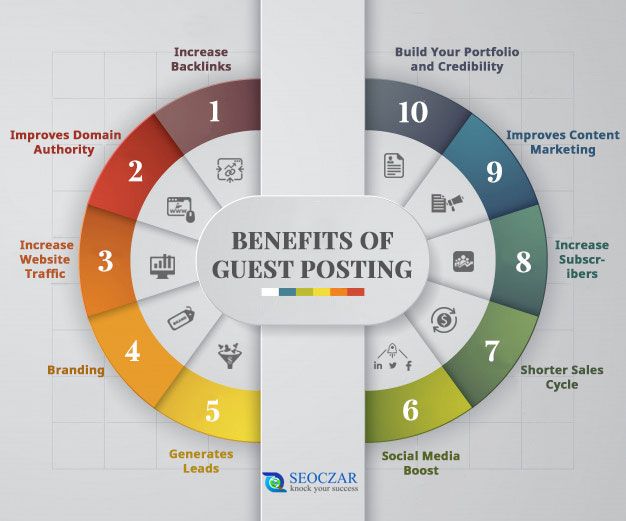
(Source: Single Grain)
The following are some strategies that will help you take your guest blogging game to the next level:
i) Connect with People in your Niche:
You’ll find bloggers who share similar interests or work in an area that relates to yours through social media or websites such as Contently (a marketplace for freelance content).
ii) Focus on the Common Ground:
Be sure to mention what sets you apart from other companies in your space, but don’t forget about things you have in common with these bloggers’ businesses.
When establishing contact, try sharing tips and tricks to use their products more effectively. Keep track of all correspondence and be responsive to any requests.
iii) Make Yourself an Expert in your Field:
Conducting research into topics related to your company’s product line or services will help make you sound like a credible source when speaking about them.
iv) Offer Free Stuff in Exchange for Exposure:
Start by offering samples of your products at events where bloggers might be present, then build up until you can offer something bigger, such as writing a sponsored post.
v) Share Data to Help Establish Trust:
Once you’ve developed a relationship with someone and it seems appropriate, consider sharing data that shows how effective your company has been over time. For example, showing your successes and failures may demonstrate the value of working together.
vi) Create Really Useful Resources:
Content such as checklists, templates, or instructional videos could provide value even after building just one connection. These tools will make it easier for bloggers to succeed without figuring everything out themselves.
11. Optimize your Site’s Internal Linking Structure
Internal linking refers to hyperlinks that point to pages on the same site. Optimizing your internal linking structure means ensuring your site’s pages are connected through a series of links.
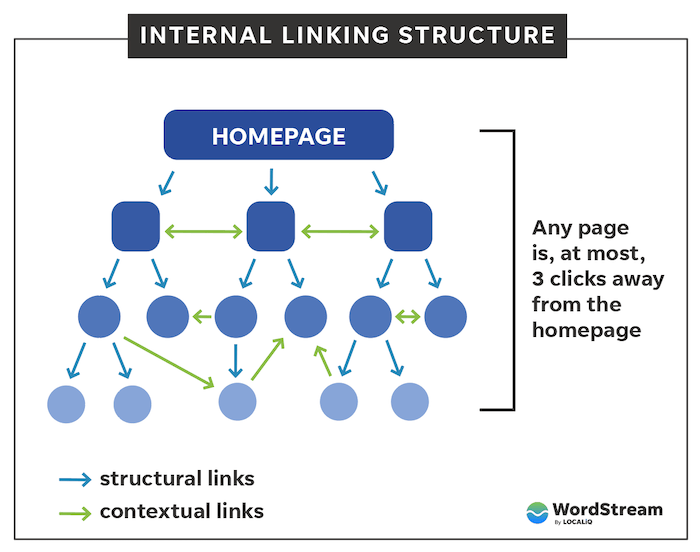
(Source: WordStream)
This way, visitors who don’t know much about your site can still navigate easily by clicking on one of the internal links on any page.
It also helps Google understand which pages are related to each other so it can assign higher rankings to those that provide the most relevant content for what searchers are looking for.
If you have an e-commerce website with hundreds or thousands of products, ensure you’ve optimized your internal link structure for product navigation.
How can you optimize your site’s internal linking structure?
- The first thing to do is ensure that the content you’re linking from page A to page B is relevant.
- Secondly, it’s a good idea to link between logically related pages.
- Third, make sure you link internally as well as externally when appropriate.
- Finally, don’t just focus on how many links there are but on how many clicks those links generate.
12. Utilize Effective Call-to-Actions
A website is perfect for telling visitors what you want them to do. Whether it’s signing up for your email newsletter, making a purchase, or filling out a contact form, make sure that your site has an easy way for people to take action on what you are trying to share.
It will increase the number of people who sign up for your newsletter, buy from you online or fill out a contact form.
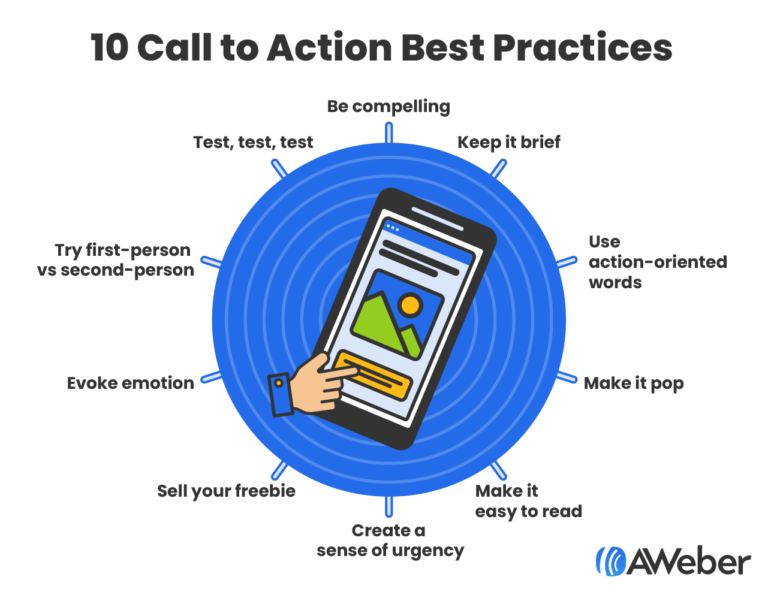
(Source: AWeber)
Tips for creating effective call-to-actions:
a) Make it Obvious:
Add to Cart works better than Order Now because it tells people exactly what you want them to do. When in doubt, less is more. Use clear language that gets right to the point, so your visitors don’t miss your call to action.
b) Test it Out:
You can never tell how effective a certain call-to-action will be until you try it out on real visitors. So try different variations of your call-to-action with real visitors and monitor the click-through rate to see which is most effective.
c) Offer Incentives:
What would make someone click on a specific button? Next, consider whether there are any perks you could offer for completing a task, like joining an email list, making a purchase, or filling out contact information.
d) Provide Instructions:
Visitors won’t follow through if they don’t know where to go or what they should do next. So always provide instructions before asking people to complete a task.
e) Place it High Up:
The top of the page (above the fold) is the best spot for your call-to-action because visitors are scrolling down and may not get past this area.
13. Ensure Site Speed is Fast
Site speed is one of the most important metrics for a website’s success. Visitors will leave a site if it takes too long to load, even if they are interested in the content.
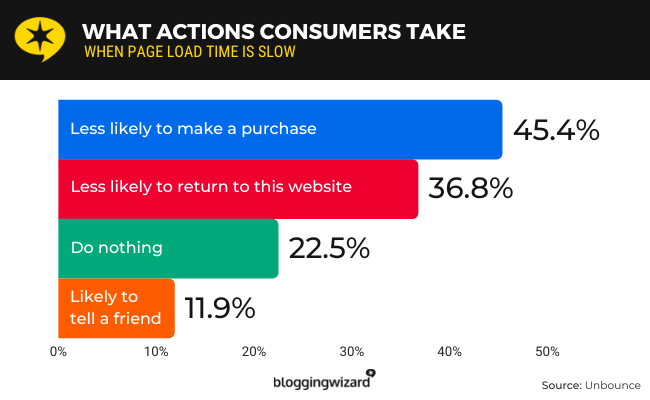
(Source: Blogging Wizard)
When looking at your site performance, you should focus on these three key components: response time (how quickly does the server return information?), total page size (too many images or videos can increase this significantly), and download time (the amount of time it takes to receive all files).
Once you have made changes to address the abovementioned problems, conduct a new speed test and see if the result has improved. You can use tools like Google PageSpeed Insights, WebPageTest, or GTmetrix to understand how well your site is performing.
Question 4: Do You Have Experience Working With Businesses in My Industry (Or a Similar Industry)?
Here’s one of the most important questions to ask a digital marketing agency before hiring one.
If you’re in an industry that has a lot of competition and marketing professionals, it’s important for the agency you hire to have experience working with businesses in your industry.
It would also be beneficial if they had experience working with businesses in a similar industry. However, as long as the similarities don’t go so deep, it would be difficult for them to understand your business needs.
For example, if you’re in the dog grooming industry and find a digital marketing agency with experience in pet food companies or animal shelters but not specifically dog groomers, you may want to keep looking.
But suppose you’re in the insurance industry, and your agency doesn’t have much experience working with that niche. In that case, it’s more likely they can still provide valuable insights about marketing.
The company might say they know how to do SEO well because they do SEO for other businesses in different industries (such as pet food companies).
In that case, you’ll need to ask detailed questions about how those experiences will translate into your industry.
It is important because one of the most common mistakes entrepreneurs make is hiring a digital marketing agency without considering their experience level first.
Once you’ve decided on an agency, reach out to previous clients in your industry and speak to them about their experience with the agency.
Find out what made a difference for them:
- Was it talking directly with a strategist?
- Was it getting helpful feedback on campaigns?
Whatever the answer is, you should expect something similar from that digital marketing agency.
Even though there isn’t one perfect digital marketing campaign, you’ll want someone who can showcase some success stories and has experience with your type of business.
Question 5: Can You Provide Me With Case Studies or Examples of Successful Campaigns You’ve Run For Other Clients?
When looking to hire a digital marketing company to work with you on your business, you need to make sure you have all the right information before signing any contracts or handing over any money.
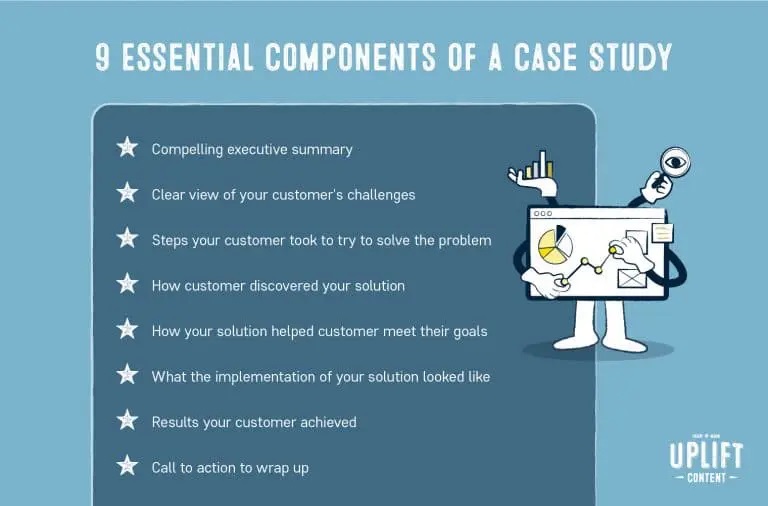
(Source: Uplift Content)
The best way to get an idea of how your campaign will go is by looking at examples of campaigns successfully executed in the past.
If you’re not sure what you’re looking for, ask your prospective agency for any case studies or examples of successful campaigns they’ve run in the past. It’s often easiest to find these on their website or social media channels.
If they are hesitant to provide any information, it could be because their previous clients don’t want them to use other people’s work as samples of their success.
While this doesn’t mean they aren’t good at what they do, it may not reflect well if they can’t show you examples of their work with other clients.
Therefore, when contacting a potential agency, ask if you can see proof of completed projects from former customers who can attest that their service was great.
Case studies are one of the most useful ways to find out what an agency can do and how it will be able to get it done.
Here are 10 reasons you should always request case studies from potential agencies and what you should look out for in them.
1) To Find Out if They are Accessible
Asking for case studies is a great way to determine if the digital marketing agency is accessible. If they can provide you with case studies, then it means that they have completed previous projects and can show you how they were able to help other businesses.
2) To Check Their Experience
Case studies can help you to check their experience, skillsets, and even their level of service. In addition, the case studies will give you an idea of what kind of work they have done in the past, whether similar or not to your project.
3) To Understand what Defines Success
Case studies help to understand what defines success by providing examples of the types of results that are possible.
4) To Assess Their Services
When looking to hire a digital marketing agency, do your research by asking to see case studies from previous clients. A case study will provide insight into the type of services they provide and whether or not they’re the right fit for your business.
Plus, it will help you feel confident that the agency is capable of helping you achieve your goals.
5) To Find out How Well They Listen and Deliver Results
It is important to find out how well they listen and deliver results. Case studies will help you know this. The case study should give an example of a project the agency has handled, its result, and how it accomplished it.
If you can’t find any case studies on their website, it’s safe to assume they are not very good at executing projects or following through with success rates since their clients would be more than happy to share the outcome of their experience.
Question 6: How Do You Measure Success – What Are the Key Performance Indicators (KPIs) You Use?
Of all the questions to ask a digital marketing agency, this stands out as very essential.
Understanding the key performance indicators (KPIs) that the agency uses will help you determine whether or not they are meeting their goals. The KPIs should also be related to your goals, and they should be specific enough so that you can tell if they are being met.
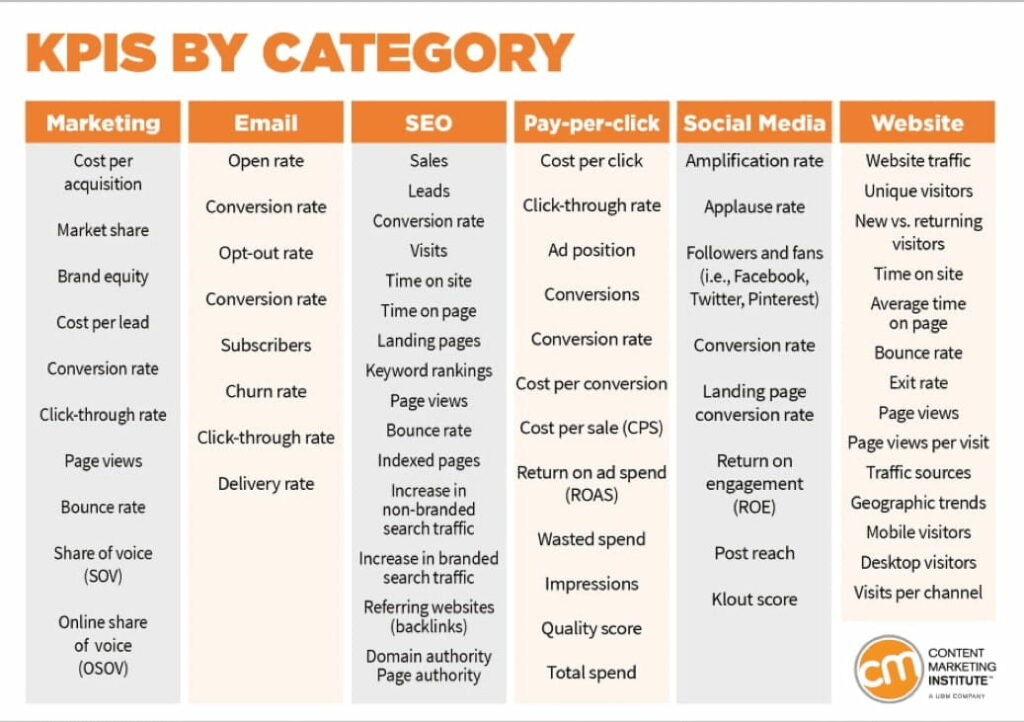
(Source: Content Marketing Institute)
If the agency doesn’t know how it measures success, ask them for more information on their process.
Ask about the KPIs that they use to measure success and see if these align with your own goals. These include click-through rates, conversion rates, cost per click, revenue generated by SEO, and many others.
Digital marketing efforts are no longer optional in today’s fast-paced, social media-driven business environment. If you want to stay competitive or keep up with the Joneses, digital marketing KPIs are necessary.
When it comes to digital marketing KPIs, some stand out from the rest. By tracking these key performance indicators (KPIs), you’ll gain valuable insights into your digital marketing campaigns and how you can optimize them in the future.
Here are 10 important metrics to keep track of if you want to achieve real ROI from your digital marketing efforts.
1) Website Traffic
Regarding digital marketing, website traffic is one of the most important metrics you should track. One of the best ways to see how well your content performs is by looking at the number of visits your site gets.
You can track website traffic through various platforms, including Google Analytics and AdSense, showing you where your visitors come from and what they do once they’re on your site.
2) Organic Search Traffic
Organic search traffic is a metric that tracks the number of visits your site receives from users who have searched for terms related to your business on Google or other search engines.
It’s important to track this metric because it helps you determine how well your content is doing and whether or not you’re meeting customer needs.
3) Paid Search Traffic
Paid search traffic is the total number of clicks on your ads. It measures how many people actively search for your business when they see your ad.
Many factors can change this metric, including the amount you bid, where and when your ads appear, and what kind of ad you’re showing.
4) Churn Rate
Churn rate is an important KPI to track because it shows the percentage of users or customers canceling their service.
You can calculate the churn rate for a company by looking at the number of customers who canceled over a specific period and dividing that number by the total number of customers during that same period.
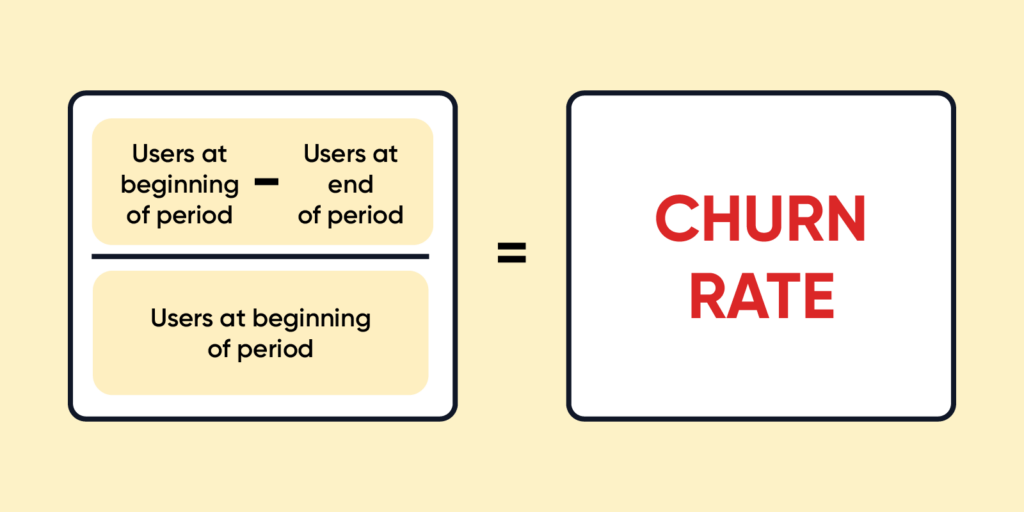
(Source: CleverTap)
5) Acquisition Cost
The acquisition cost is often the first thing on marketers’ minds. The metric is calculated by dividing the total marketing spend by the number of new customers acquired in a certain time frame, usually a month or quarter.
The bottom line is that this metric helps you understand what your marketing budget can buy you in terms of actual customers.
6) Average Order Value (AOV)
AOV is the total cost of goods sold divided by the number of orders. It tells you how much each customer spends on average.
The problem with AOV is that one or two large orders can skew it, so it’s better to use Median Order Value (MOQ), which takes the middle number of an ordered list and divides it by the total number of orders.
7) Customer Lifetime Value (LTV)
Customer Lifetime Value (LTV) measures the total revenue a customer will generate for your company over their lifetime.
LTV is calculated by multiplying the average revenue per user by the number of years they’ll spend with you and then subtracting any additional costs associated with acquiring them as customers.
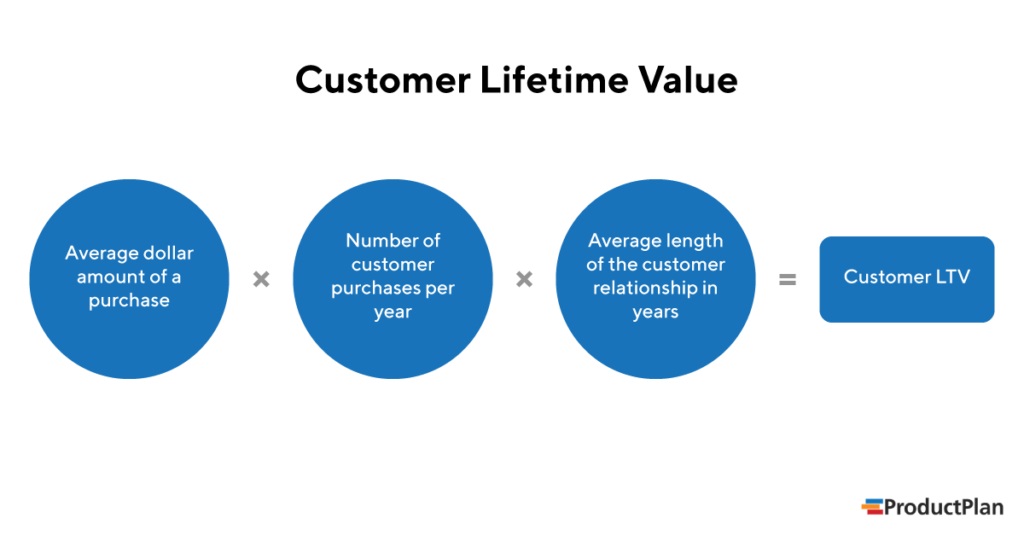
(Source: ProductPlan)
So, for example, if someone spends $5 on your product and stays with you for 3 years, their LTV would be $15.
8) Conversion Rate
Think about your conversion rate as the number of visitors who take one or more of your desired actions divided by the total number of visits to your website.
For example, if you have a conversion rate of 10%, that means for every 100 visitors, 10 will become customers. A high conversion rate is a worthy goal, but it isn’t easy to maintain.
9) Brand Awareness
Brand awareness is the general knowledge consumers have of your brand. In the digital world, this could mean the number of followers you have on social media or how many people visit your website.
10) Engagement Rate
It’s important to measure how engaged your audience is with your content. This metric is typically expressed as a percentage of your total number of followers. The higher it is, the more engaged your audience is.
11) Social Media Engagement Rate
Social Media Engagement Rate is the percentage of followers on your social media channels actively interacting with your content. It’s a really important metric because it can indicate how engaged your audience is with what you’re doing. The higher the number, the better!
12) Click-through Rate
One of the most important metrics to track is your click-through rate or CTR. A high CTR means people are engaging with your content enough to click it. A low CTR means they’re not interested in what you’re offering.
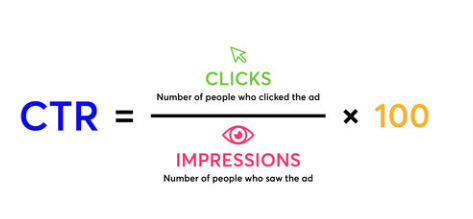
(Source: Kargo)
13) Cost Per Click
What is a Cost Per Click? Simply put, it is the cost of an advertisement. It’s also called CPC, meaning the cost per click. Clicks can bring customers to your business.
You’ve made money if a person clicks on your advertisement and visits your website. A good way to think about it is that CPC is the amount you pay every time someone clicks on your advertisement, but they don’t have to buy anything.
14) Cost Per Lead
It’s important to track the cost per lead. It’s not enough to know how many leads you’re generating. You also need to know how much they cost you.
You can calculate the cost per lead by dividing your marketing costs by the number of leads generated.
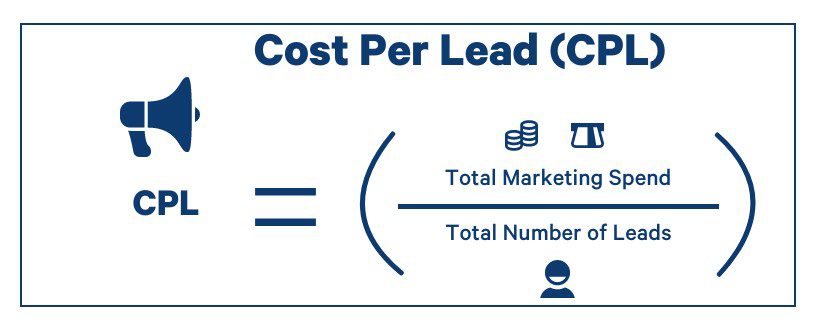
(Source: Trustmary)
15) Impressions
Impressions are when your post, video, or other content is shown on someone’s screen. This metric shows the number of times your content has been displayed to viewers.
However, this may not accurately represent the number of people who have seen your post because impressions can vary greatly depending on what type of device you’re viewing it on.
16) Reach
Reach is when someone sees your post, video, or other content and interacts with it in some way—by liking it, sharing it on social media, commenting on it—anything that would indicate they’ve seen it and interacted with it some way.

(Source: Digital Media Metrics)
Question 7: What’s Included in Your Pricing, and Are There Any Additional Costs That I Should Be Aware Of?
Pricing is an important part of any project, so you must determine how much you’ll need to budget for your marketing campaign. At the same time, it’s also crucial that you know what you’re getting in return.
Some questions to ask a digital marketing agency about pricing include: “What’s included in my pricing?” Or “Are there any additional costs that I should be aware of?”
Keep in mind that while they may not be included in your package, many other factors can impact your cost, such as:
- Additional design services (e.g., custom logos);
- Printed materials (e.g., brochures);
- Video production (e.g., pre-roll ads);
- Search engine optimization (e.g.,keyword research);
- Agency overhead costs (some agencies will take a cut from the money they spend on ad buys on behalf of their clients);
- Marketing campaigns that run long-term rather than just one-off jobs (as these tend to have higher monthly costs due to increased traffic).
If you’re looking for an agency that provides all aspects of marketing, ensure you’re comfortable with their pricing structure. If not, consider hiring individual contractors who specialize in specific areas where you need help.
Question 8: What Kind of Results Can I Expect From Working With You, and Over What Time Frame Will I See These Results?
The kind of results you can expect from working with an agency depends on the scope of your project.
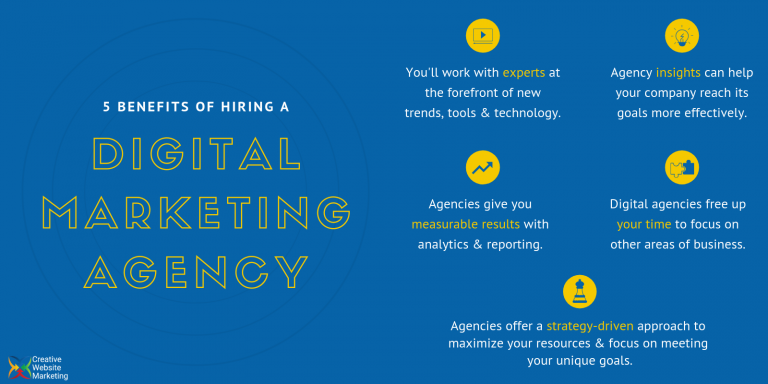
(Source: Creative Website Marketing)
For example, suppose you need social media posts that link to your website content or blog articles. In that case, it will be quicker than if we are tasked with search engine optimization for a website or complete social media strategy.
The time frame for these results will depend on how long it takes for the work the agency does to impact Google’s search engine ranking algorithms.
If you have a newly launched product and want to see it rank highly in Google searches within one month, then the agency may not be able to get your desired result within this timeframe.
However, if you’re looking for improved organic traffic over the next six months or longer, their services could help increase traffic while maintaining strong rankings in search engines.
Question 9: Do You Have Any References or Testimonials From Previous Clients I Can Speak to About Your Services?
BigCommerce reports that 72 percent of consumers tend to trust a business more after reading their positive reviews and testimonials.
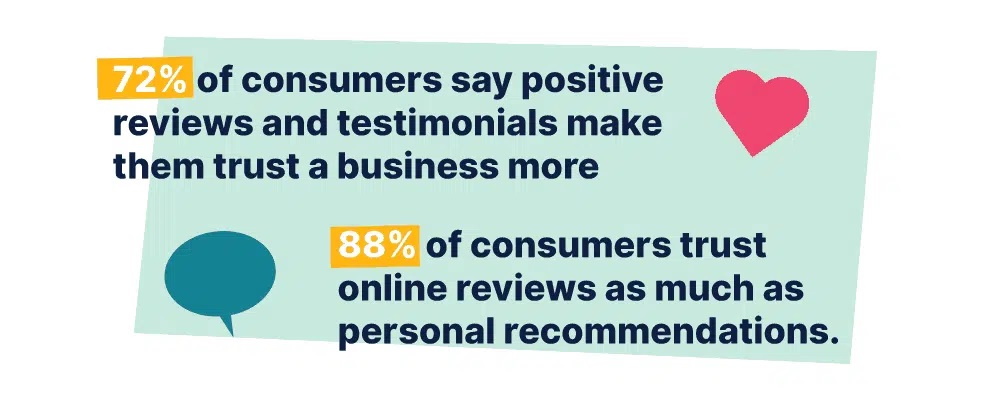
(Source: Wyzowl)
Asking to speak to previous clients is a great way to get more information about the agency you are considering hiring. You may be able to learn more about their work ethic and the quality of their services.
You can also learn about what type of marketing campaigns they have done in the past, which will help you decide whether or not this company will be able to help you with your specific needs.
The internet has made it easier for customers to find reviews and feedback from others who have used the services of a particular company before.
When asking for references, ask if it’s okay for them to provide personal contact information so that you can talk to these people privately instead of doing an online search where they could be inundated by other people looking for testimonials.
So, make this one of the crucial digital marketing questions to ask your potential agency.
The top 10 Reasons you Should Always Request References or Testimonials Before Hiring a Digital Marketing Agency
A digital marketing agency can be an important partner in your company’s success, but it can also be easy to end up with an agency that isn’t worth your money. In addition, it can be hard to tell whether you’re getting value from the agency or not.
To ensure you’re spending money on the right digital marketing agency, ask for client references or testimonials before signing any contracts.
Here are the top 7 reasons you should request references or testimonials from agencies before making any decisions regarding hiring them to help with your company’s digital marketing efforts.
Reason #1: Confidence in Expertise
Using previous client success stories to build confidence in your expertise is a powerful reason you should request references.
You should immediately look elsewhere if you are hiring a digital marketing agency that can’t show you any past client testimonials.
Two main things make up an excellent testimonial: quality and quantity. Regarding quality, having 5 great customer comments will have more weight than having 50 mediocre ones.
Reason #2: Objective Point of View
By asking an outside agency to provide references, you get an objective perspective on that company’s performance and service.
They won’t be as tied to their work as they would be if they were providing a testimonial for themselves. It allows you to get more accurate feedback about their work and whether it was effective for your business or not.
Also, the person answering will have no stake in whether they give you a glowing review or not and is likely to be more honest because of it.
Reason #3: The Increased Likelihood that you can Retain the Agency Long Term
Most agencies work on retainer fees, and retainers are often long-term (1 year, 3 years, etc.). Therefore, increasing the likelihood that an agency can deliver great results over an extended period requires that the agency put its best foot forward.
An agency that can prove they have delivered results in the past is more likely to be able to deliver your desired results moving forward.
Reason #4: Efficiency
Simply put, efficiency comes from experience. But does asking for references or testimonials guarantee efficiency?
Absolutely! Let’s say you want to hire a digital marketing agency to optimize your website to generate more sales.
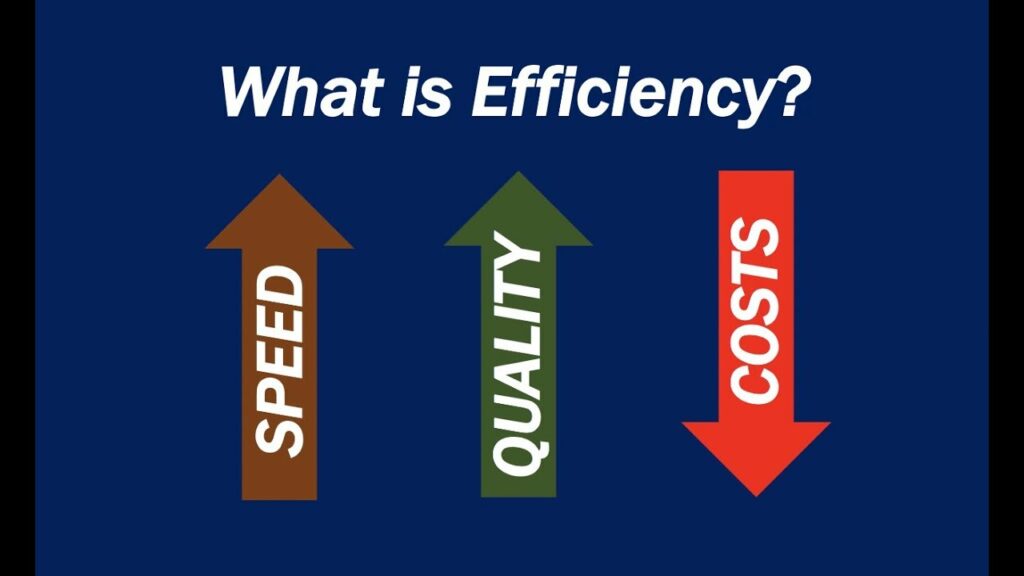
(Source: MBN)
When evaluating which company to work with, requesting references and testimonials can be extremely helpful. If a company can provide you with at least two success stories (preferably three or more), you can be sure they know how to execute successful SEO campaigns.
Reason #5: Relationship Building
It’s obvious why references or testimonials can help build relationships. You want to know you are hiring a digital marketer you can trust and that understands your unique needs.
If the agency doesn’t have references or testimonials, how will you know they are trustworthy?
Reason #6: Costs Savings, Avoiding Hiring Mistakes, and Better Results
Clients who provide references and testimonials of their experience with previous agencies, whether they were good or bad, are more trustworthy than someone who doesn’t have them.
It helps you avoid hiring any agency that may harm your brand and reputation because of a lack of knowledge, talent, and professionalism. It also allows you to contact previous clients to ask about cost savings, better results, and impact on business growth.
Reason #7: Checks and Balances
If you only base your decision on what an agency tells you during their sales pitch, how do you know they’re telling you everything? That’s where references and testimonials come in.
It helps to get another point of view; someone who was actually on the other side of the table. This way, you can get a clearer picture of what it’s like working with that agency. It can help you decide whether or not they are truly right for your business.
Question 10: What Are Your Expectations of Us as a Client?
What are your expectations of us as a client? It is one of the most essential questions to ask a digital marketing agency that lets you know what the agency is looking for from its clients. It also gives you an idea of how much work they want to put into your campaign.
If you’re not willing to spend money on Facebook Ads, don’t expect an agency to do it for free. Ensure expectations are understood on both ends before working with a new digital marketing company.
Some companies will charge upfront, while others will charge at the end of a project. Either way, this is one of the digital marketing questions to ask so you’re clear on what’s expected and where all costs will be coming from so there aren’t any surprises later down the road.
Question 11: What Kind of Reporting Can I Expect?
You can’t compile marketing questions to ask a company without adding a question about reporting. When you hire a digital marketing company, one of their main benefits is reporting so you can see how they’re performing and how much money they’re making you in return.
One of the most important questions to ask a digital marketing agency is what kind of reporting you can expect. There’s no point in hiring a digital marketer that doesn’t offer any reports or one that provides incomplete and inconsistent reports.
The main thing you’re looking for is consistency, reliability, and completeness. These are all qualities of an excellent digital marketing agency.
(Source: Techno-PM)
It will provide reliable and consistent reports that give you insight into how your campaign is going and help ensure it’s on track.
However, it can be not easy to know what to expect from the reports that agencies typically provide, especially if this isn’t your first time working with an agency and this isn’t the first agency you’ve hired in the past.
We will help you understand the three most common types of reporting that agencies provide to their clients and what information will be included in each type.
1) The Check-up Report
The check-up report is the first type of report you should expect. We believe it’s the most important one.
This report will give you a quick overview of how your SEO agency is progressing and what type of results to expect in the future. It should be delivered monthly so you can stay updated with all the progress made since your last check-up meeting.
What Information is Included in a Check-up Report?
So what’s in store for you in your first check-up report? First, your digital marketing agency will break down its work into different parts.
Within each area, they should share specific results and insights that make sense for your particular business. Your objective is to determine if you’re achieving your marketing goals and how any roadblocks might impact progress.
Suppose there are no issues or delays; great! But if there are, it’s time to address them immediately so your campaign doesn’t stall. In most cases, you can expect an executive summary at the top of your check-up report, followed by more detailed sections on each part of their strategy.
2) The Success Report
The success report is a more detailed version of the check-up report. It will include analyzing your website performance, traffic increases, ranking keywords, and revenue generation. This type of reporting provides concrete evidence that proves our work is effective.
What Information is Included in a Success Report?
This report will show you how well your digital marketing campaigns are doing and whether or not we’re achieving your business goals. In addition, the report will include factual information about site traffic, leads generated, and conversion rates.
It should also include suggested improvements to increase your effectiveness with digital marketing over time.
3) The Update Report
Every agency should be able to send you an update report at least every other week, if not more frequently. The update report will inform you of what your marketing team is doing and how they spend their time (both on your behalf and on their own).
It is important because marketing is like eating: If you don’t pay attention, things can get out of hand quickly. Also, note that monthly reports are often too infrequent for agencies to monitor client campaigns adequately.
So remember, update reports are an agency’s way of communicating with you about what they’re doing for you and what your next steps should be. If your agency doesn’t send them, ask them to. If they aren’t willing to provide them, find another agency that will!
What Information is Included in an Update Report?
An update report should include information about your company, such as:
- We’ve been following up with several former clients.
- We’re trying to get in touch with Jane Smith and Gary Barker, who haven’t responded yet.
- We’ve noticed that you don’t have any retargeting ads on Facebook. So we recommend you create them immediately so we can start getting leads from that channel as soon as possible.
- Here are some best practices for creating retargeting ads on Facebook.
- We created three new blogs last week—one for each of our top-selling products—and they already have five comments each.
How Can You Tell Who To Trust?
Are there other questions to ask a digital marketing agency you would like to add to this list?
Hiring a digital marketing agency without asking the right questions first can lead to cost overruns, service failures, and general dissatisfaction with the agency.
Each agency brings its expertise and style to the table. Unfortunately, it isn’t easy to figure out which digital marketing agency would be right for your company. After all, it’s not enough to choose one randomly on a whim.
That’s why we created Flying V Group. We believe transparency is important and that everyone should be able to know whether an agency can do what they say. Give us a call!

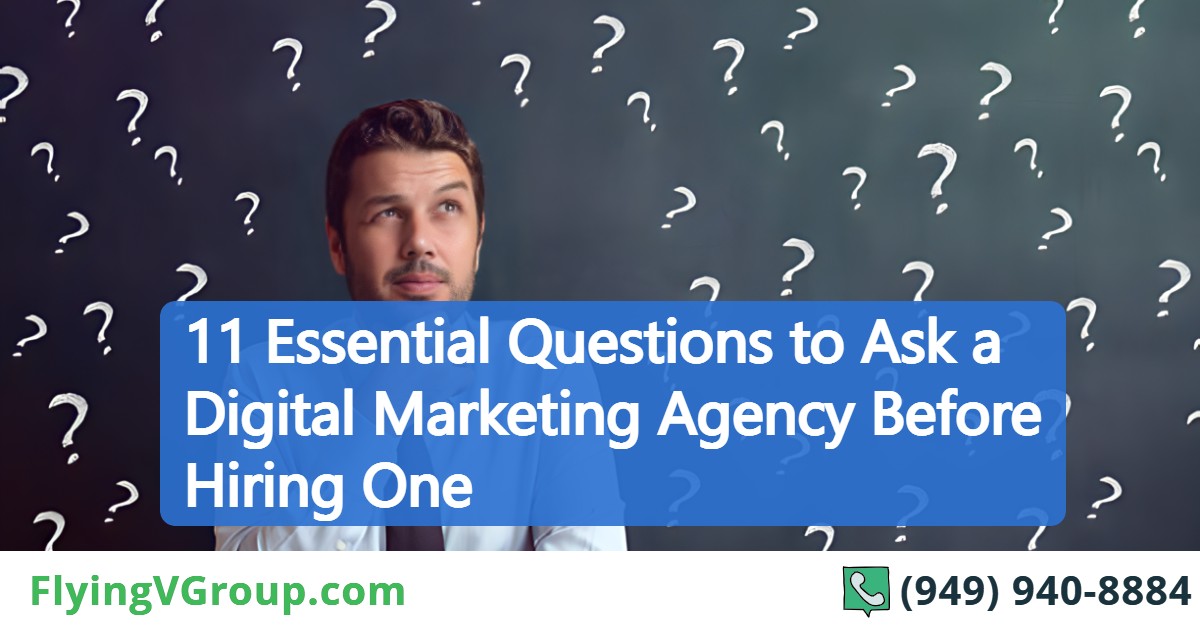




0 Comments